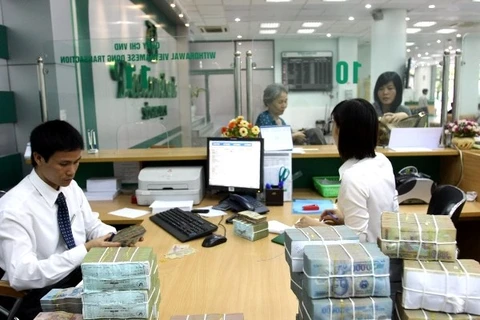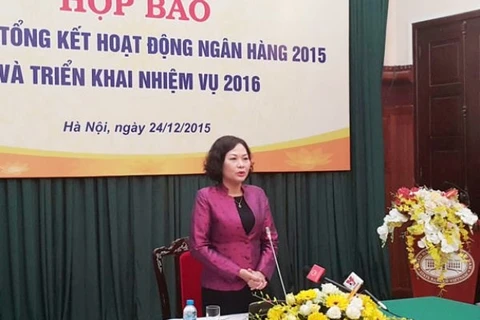Hanoi (VNA) - The State Bank of Vietnam (SBV) has told credit institutions to obey legal regulations on deposit interest rates to ensure safety of institutions and stabilise the local monetary market.
The move was made this week after some institutions recently offered many promotional programmes and bonuses to attract depositors, taking their real interest rates higher than the rate cap of 5.5 percent per year for short-term dong deposits regulated by the central bank. Currently, the central bank sets the rate cap only on short-term deposits of less than six months.
Under Circular 297/NHNN-TTGSNH, the central bank said that credit institutions are not allowed to use ‘technical measures' as a loophole to indirectly exceed the central bank's rate cap. The central bank prohibits any unhealthy competition in the capital attraction of credit institutions.
According to the circular, credit institutions must issue written instructions before January 25 to instruct their subsidiaries and branches obeying the regulation.
Banking supervision and inspection agencies will enhance their watch on the implementation of obeying the rules. Fines will be imposed in case of violations.
For the past few weeks, many credit institutions have offered numerous promotions and bonuses of interest rates or gifts to depositors to meet their rising capital demands towards the end of the lunar year. The programmes have increased the operating costs of institutions, causing negative impacts on the interest rate levels in the domestic market.
Besides, 14 credit institutions have adjusted their deposit interest rates upwards by roughly 0.1 percent to 0.5 percent per year in many terms for the past month, according to statistics from the central bank.
According to experts, capital mobilisation at banks has been busier than previously as the credit of the entire banking system has increased sharply, causing a temporary shortage of liquidity in some banks. Credit in 2015 surged 18 percent, compared with 12 percent in 2011, 10.9 percent in 2012, 12.51 percent in 2013, and 14.16 percent in 2014.
The central bank in 2016 is also targeting a credit growth rate of 20 percent.
The rise in bank deposit interest rates at the end of 2015 is causing anxiety among businesses that there could be a commensurate increase in loan interest rates soon.
Pham Ngoc Hung, deputy chairman of the HCM City Union of Business Associations, said the formation of the ASEAN Economic Community, several free trade agreements taking effect, and the Trans-Pacific Partnership to be signed soon are already creating huge pressure on businesses.
"Profit rates are low and so companies can not cope with high lending interest rates."
For many businesses, bank loans are the major source of working capital.
The average interest rates have fallen considerably compared to three or four years ago, but remain high compared to other countries in Viet Nam's neighbourhood.
Nguyen Quoc Anh, chairman of the HCM City Rubber and Plastic Manufacturers Association, said unless policies are changed and interest rates are reduced, or at least kept steady, Vietnamese companies can barely survive the integration.
"Rubber and plastic manufacturers can hardly survive.
"Enterprises want lending interest rates reduced."
At recent programmes by HCM City authorities to bring companies and banks together, the biggest concern was interest rates, particularly on medium- and long-term loans.
Many companies asked for fixed rather than floating interest rates to enable them to invest in new machinery and plants and others.
But in Vietnam, interest rates are fixed for only the first year, and the second at most, and often volatile, making most companies apprehensive about investing using borrowed money.
But Nguyen Hong Minh, Deputy Director of the SBV's HCM City branch, said it is not easy to reduce interest rates because the central bank has to defend the dong against the dollar.
By buying the currency to keep it steady against a strengthening dollar, the SBV mops up a lot of dong, causing a shortage in the market and forcing banks, hence to hike deposit interest rates to mobilise dong, he said.
But the SBV uses other tools like open market operations to help commercial banks improve their liquidity, he said, adding banks do not need to increase lending interest rates.
Vo Minh Tuan, chairman of Dong A Bank, said the inflation rate last year, at below 1 percent, was the lowest since 2001.
Oil prices are unlikely to fall further, the US is likely to raise interest rates, the yuan could depreciate, meaning credit interest rates in Vietnam cannot fall, he said.
"The country's key task now is to channel funds into the main production sectors.
"Money ploughed into speculative fields, including real estate, should be restricted."
Nguyen Phuoc Thanh, Deputy Governor of the SBV, said credit growth this year will be restricted to 18-20 percent, a rather high rate in the current economic context.
"The SBV will control lending to real estate, especially medium- and long-term loans."-VNA

























